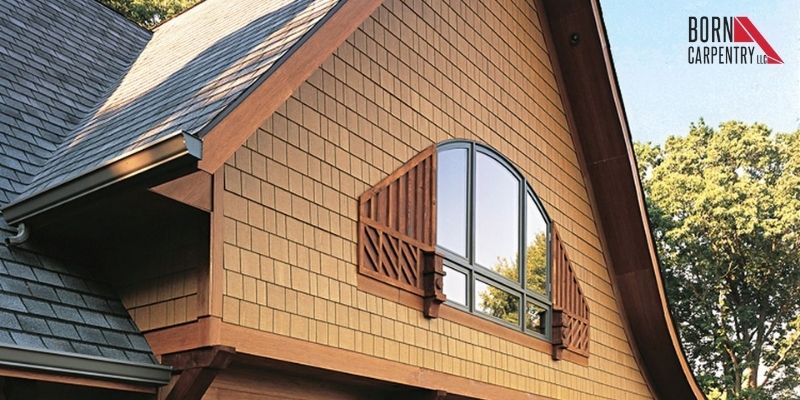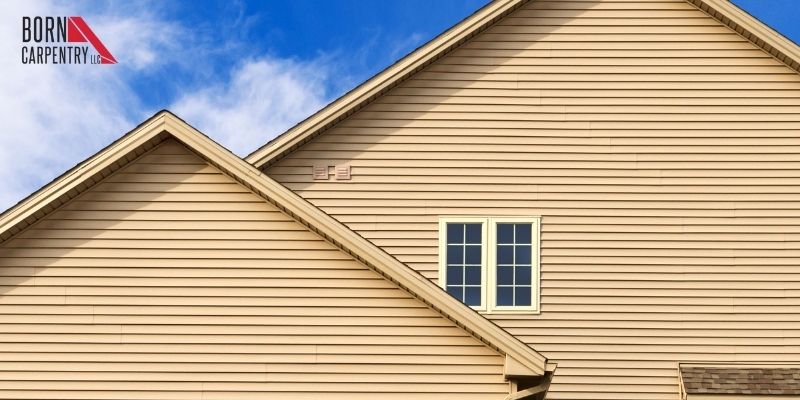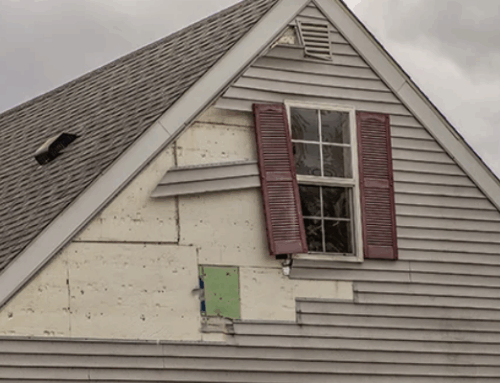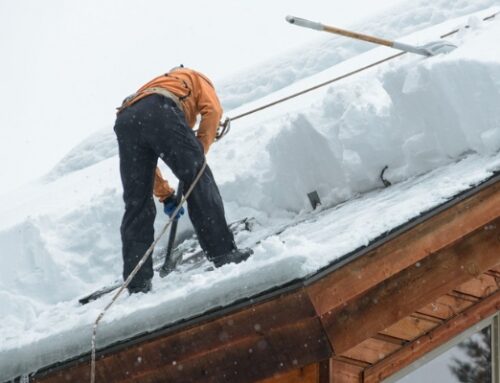Highlighting the essential features of your home can increase its aesthetic value. Besides improving the visual appeal of your house, siding prevents heat loss and protects buildings against exposure to weather elements. You can use different siding options to achieve this goal and create a perfect façade for your home.
Choosing an ideal siding to cover the exterior walls of your home can be challenging. You have to consider many factors besides the aesthetic value of a siding. Its durability should be a priority. Also, consider its ease of installation, required maintenance, cost, versatility and water resistance.
A better understanding of the qualities of each type of siding will help you make a suitable selection for your home.
What are some different types of siding?
Natural Wood Siding

Wood siding comes in two styles: the long strips of wood installed horizontally (clapboard) and the smaller pieces of wood (shingles). The aesthetic appeal and texture of the latter remain unmatched. You can customize the look of the material by painting or staining the wood.
Known for their durability and attractiveness, redwood and cedar are the best materials for wood siding. They give houses an impressive look.
If properly maintained, wood siding can last for over 20 years. Sealing it with a semi-transparent stain, varnish or paint improves its durability as well as a home’s curb appeal.
The frequency of the refinishing depends on the environment and the type of wood used. However, in general, the siding will need a fresh coat of finish used every three to seven years.
Wood siding offers a sought-after charm and warmth that is difficult to replicate. However, it is costly and requires more maintenance than other sidings. Wood can burn, so consider adding a flame retardant chemical to your wood siding to resolve this issue. Meanwhile, wood siding is susceptible to damage by termites and moisture, causing the material to decay and bend. It is best to check the integrity of your siding regularly. If rotten, replace the affected portion.
Engineered Wood
Though it looks like natural wood, engineered wood is a manufactured product made from a blend of materials. Engineered wood possesses the attractiveness of natural wood, but offers superior durability. It is an ideal option for versatile applications. This type of siding is a fraction of the cost of natural wood and requires less maintenance.
Protecting engineered wood siding from moisture can maintain its longevity. Water trapped behind it supports the growth of mold and mildew.
Vinyl Siding

Vinyl siding is ideal for homes that need weatherproof protection against precipitation and storms. It is lightweight and comes in a variety of styles and colors. Some finishes of vinyl siding mimic the look of natural wood. Its affordability and easy maintenance make vinyl a popular siding choice for most homes.
Vinyl siding is fire-resistant. Its newer versions have an insulation layer attached within the ridge of their panel(s). The insulation prevents heat loss from your home, saving you some money. In addition, they have a wide range of colors too.
Unfortunately, vinyl siding products are not durable and are susceptible to melting, cracking and buckling. They are also sensitive to harsh weather conditions and excessive exposure to UV rays.
Fiber Cement Siding
Fiber cement siding is manufactured from a mixture of cement, sand, clay and wood pulp. Fiber cement products mimic the looks of other siding types, including wood. They are available in a range of textures and styles. They are durable and withstand harsh weather like strong winds and hail. Factory finishes or painting is preferable for this kind of siding. You can use fiber cement for different styles of buildings.
Recent fiber cement siding contains no asbestos. It is non-flammable, doesn’t rot, is fire-resistant and free from termite attacks. However, its installation is expensive. It isn’t energy-efficient and it absorbs moisture. Frequent freeze and thaw cycles or excessive humidity can cause it to crack or break.
Brick Siding
Bricks are highly durable, lasting for hundreds of years. They are heavy and can bear heavy loads. As a result, they are often used to structure buildings rather than as mere façades. They are made of shale and fired clay and are available in various textures and sizes. Current brick siding panels offer a similar aesthetic value as genuine bricks.
Brick siding is made of veneer. A membrane placed between the house and the siding protects the veneer from water.
Brick is one of the best sidings. It improves the value of your home and requires low maintenance. Real bricks are biodegradable and can be recycled. However, they are the most expensive siding option.
Metal Siding
Metal is becoming a trending siding option. Previously, many people only considered it as a roofing material. Metals like steel and aluminum are durable and can withstand extreme weather conditions. Metal siding is easy to install, requires no maintenance, is resistant to fire and pests and doesn’t rot. However, metals are not soundproof, are poor insulators and are prone to dents and rust. That said, metal siding can be customized as imitations of other exterior covering types.
Other siding types are stone-veneer, composite, stucco and Hardie board. If you are looking for the best siding for your home, then cost, durability, aesthetic value and maintenance are vital factors to consider before making a selection.
Benefits Of Siding
Most siding materials are easy to maintain. Besides providing an ideal façade for your home, siding offers the following benefits.
- Siding protects your house from harsh weather elements.
- It improves your home value by increasing its curb appeal.
- It reduces your energy bills by providing insulation for your home.
- It reduces painting costs. You won’t have to repaint your house as often as you would have done in the absence of siding.
Conclusion
Siding beautifies the exterior of your home, thereby increasing its value. Great siding can help attract buyers if you want to sell the house. It also protects your home from damage. You have to consider the pros and cons of each siding type to make an ideal choice for your home. If you are not sure which siding would be a perfect fit for your home, call Born Carpentry at 612-747-8003 for more information.






